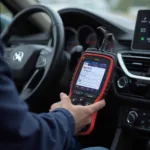An OBD2 scanner is an essential tool for any car owner or mechanic, providing valuable insights into your vehicle’s health. But what happens when your obd2 scanner will not connect? This frustrating issue can prevent you from diagnosing problems and maintaining your car effectively. This comprehensive guide will explore the common reasons why your OBD2 scanner might not be connecting and provide practical solutions to get you back on track.
Common Reasons Why Your OBD2 Scanner Will Not Connect
Several factors can contribute to OBD2 connection problems. Identifying the root cause is crucial for effective troubleshooting. Let’s delve into some of the most common culprits:
- Blown Fuse: A blown fuse in your car’s OBD2 port circuit can prevent power from reaching the scanner. Check your car’s fuse box and replace the blown fuse if necessary.
- Faulty OBD2 Port: The OBD2 port itself can become damaged or corroded over time, hindering connectivity. Inspect the port for any physical damage or debris.
- Incompatible OBD2 Scanner: Not all OBD2 scanners are compatible with all vehicle makes and models. Ensure your scanner supports your car’s specific OBD2 protocol.
- Software Issues: Outdated or corrupted software on your scanner can cause connection problems. Update the scanner’s firmware to the latest version. bafx obd2 not connecting
- Wiring Problems: Damaged or loose wiring in the OBD2 circuit can disrupt communication between the scanner and the car’s computer. Inspect the wiring for any visible issues.
Troubleshooting Your OBD2 Connection
If your obd2 scanner will not connect, try these troubleshooting steps:
- Check the Basics: Ensure the scanner is powered on and firmly connected to the OBD2 port. Try a different OBD2 port if available.
- Verify Compatibility: Double-check that your OBD2 scanner is compatible with your car’s make, model, and year. Consult the scanner’s documentation or the manufacturer’s website for compatibility information.
- Inspect the Fuse: Locate the OBD2 port fuse in your car’s fuse box. If the fuse is blown, replace it with a fuse of the same amperage.
- Examine the OBD2 Port: Look for any signs of physical damage, corrosion, or debris in the OBD2 port. Clean the port with compressed air or a specialized OBD2 port cleaner.
- Update Scanner Software: Check for firmware updates for your OBD2 scanner. Outdated software can lead to compatibility issues.
- Check Car Battery: A weak or dead car battery can sometimes prevent the OBD2 scanner from connecting. Ensure your car battery has sufficient voltage.
- Test with Another Scanner: If possible, try connecting a different OBD2 scanner to your car. If the other scanner connects successfully, the problem likely lies with your original scanner.
Why Won’t My OBD2 Scanner Connect to My Specific Car?
Sometimes, even with a compatible scanner, you might encounter connection issues with a specific car model. d900 obd2 scanner not connecting to ecu This can be due to variations in OBD2 protocols or unique vehicle configurations. Consult online forums or contact the scanner manufacturer for assistance with specific car models.
What if the OBD2 port has power but the scanner still won’t connect?
If your OBD2 port has power but the scanner still won’t connect, the problem likely lies with the communication lines. This could indicate a wiring issue or a problem with the scanner itself.
“Always start with the basics. A simple blown fuse or loose connection is often the culprit behind OBD2 connection problems,” says John Smith, Senior Automotive Diagnostic Technician.
Conclusion
Troubleshooting an obd2 scanner will not connect issue can be a systematic process of elimination. By following these steps and checking for the common causes, you can often resolve the problem yourself and restore your scanner’s functionality. car obd2 not working Remember to consult your car’s manual and the OBD2 scanner’s documentation for specific instructions. obd2 scanner not connecting to car
“Keeping your OBD2 scanner’s software up-to-date is crucial for ensuring compatibility and optimal performance,” adds Jane Doe, Certified Automotive Electronics Specialist.
FAQs
- Why is my OBD2 scanner not turning on? Check the power source and ensure the scanner’s battery is charged or connected properly.
- Can I use any OBD2 scanner on my car? Not all scanners are compatible with all cars. Check for compatibility before purchasing.
- What does a blinking light on my OBD2 scanner mean? A blinking light usually indicates communication activity. Consult your scanner’s manual for specific light codes.
- How do I update my OBD2 scanner’s software? Refer to the manufacturer’s website for instructions on how to update your specific scanner model.
- Where is the OBD2 port located in my car? The OBD2 port is typically located under the dashboard on the driver’s side. Consult your car’s manual for the exact location.
- What if my OBD2 scanner still won’t connect after trying all these steps? Contact the scanner manufacturer or a qualified automotive technician for further assistance.
- Can a bad ground cause OBD2 connection problems? Yes, a faulty ground connection can disrupt communication between the scanner and the car’s computer.
For more information, check our other articles about specific OBD2 scanner issues, such as 2015 ford explorer obd2 locatipn.
Need further assistance? Contact us via WhatsApp: +1(641)206-8880, Email: [email protected] or visit us at 789 Elm Street, San Francisco, CA 94102, USA. We offer 24/7 customer support.
